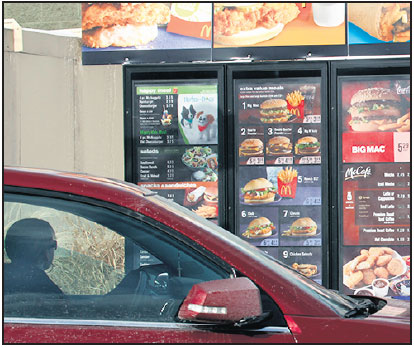Fast-food chains aim to change junk food image
Fast-food chains have a New Year's resolution: drop the junk.
As people express distaste for food they think is overly processed, McDonald's, Taco Bell and other chains are trying to shed their reputation for serving reheated meals that are loaded with chemicals. That includes rethinking the use of artificial preservatives and other ingredients customers find objectionable.
"This demand for fresh and real is on the rise," says Greg Creed, CEO of Yum Brands, which owns Taco Bell, KFC and Pizza Hut.
During the presentation for analysts and investors last month, Creed says the company needs to be more transparent about ingredients and use fewer preservatives.
Recasting fast food as "fresh" and "real" will be tricky, in large part because it's so universally regarded as cheap and greasy. Another problem is that terms like "fresh", "real" and "healthy" have nebulous meanings, making it hard for companies to pin down how to approach transformation.
One way chains are looking to redefine themselves is by purging recipes of chemicals people might find unappetizing. Already, packaged food and beverage companies have reformulated products to remove such ingredients, even while standing by their safety. PepsiCo, for instance, says it would remove brominated vegetable oil from Gatorade after a petition by a teenager noted it isn't approved for use in some markets overseas.
And fast-food chains are indicating they want to jump on the "clean label" trend, too:
Last month, McDonald's USA president Mike Andres outlined improvements the company is working on, including the simplification of ingredient labels. Without providing details, he said to expect some changes in early 2015. The remarks came after the company reported a 4.6 percent decline in US sales for November, capping two years of struggling performance.
"Why do we need to have preservatives in our food?" Andres asks, noting McDonald's restaurants go through supplies quickly. "We probably don't."
Subway, a privately held company that does not disclose sales, started airing TV ads on Thursday for its new chicken strips free of artificial preservatives and flavors. After suffering bad publicity, the company said last year it would remove an ingredient from its bread that an online petition noted was also used in yoga mats. The ingredient, azodicarbonamide, is approved by the Food and Drug Administration and widely used as a dough conditioner and whitening agent.
Chick-fil-A said in 2013 it would remove high-fructose corn syrup from buns and artificial dyes from its dressings. A couple months later, it said it plans to serve only chicken raised without antibiotics within five years.
It's not clear how far fast-food companies will go in reformulating recipes. But the nation's biggest chains are facing growing competition. In the latest quarter, customer visits to traditional fast-food hamburger chains declined 3 percent from a year ago, according to market researcher NPD Group. Fast-casual chains - which are seen as a step up from traditional fast-food - saw visits rise 8 percent.
Part of the appeal of fast-casual chains is that they position themselves as being higher in quality. Chipotle, which touts its use of organic ingredients and meat from animals that were raised without antibiotics, says sales at established locations surged 19.8 percent in the most recent quarter. And Panera vowed this summer to remove artificial colors, flavors and preservatives from its food by 2016.
Michele Simon, a public health lawyer and author of Appetite for Profit: How the Food Industry Undermines our Health and How to Fight Back, says getting rid of additives here and there won't be enough to change the way people think about fast food.
"That's just rearranging the deck chairs on the Titanic," Simon says. "These companies have a fundamental problem in who they are."
|
A customer looks at the menu at a McDonald's drive-thru in New York. Chains are trying to shed their reputation for serving reheated meals that are kept intact with chemicals. David Duprey / AP |

























